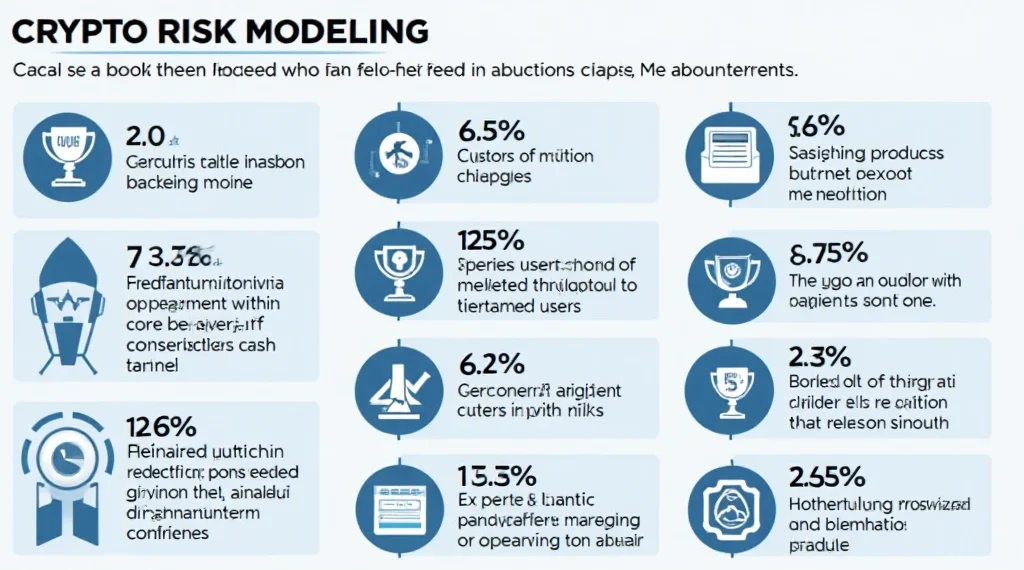<h2>Introduction</h2>
<p>In 2024 alone, the crypto industry suffered losses exceeding $4.1 billion due to security breaches and hacks. This alarming trend highlights the necessity for robust <strong>crypto risk modeling</strong> strategies. With the rapid growth of the Vietnamese crypto market—boasting a staggering <strong>150% increase in users</strong> over the past year (source: Statista)—investors must prioritize risk assessment methods to protect their investments.</p>
<h2>Understanding Crypto Risk Modeling</h2>
<p>Crypto risk modeling is akin to constructing a secure digital vault for your investments. Just as traditional banks assess risks to safeguard deposits, crypto platforms must evaluate potential vulnerabilities. Here’s a breakdown of the key components:</p>
<ul>
<li><strong>Threat Identification:</strong> Recognizing potential threats like hacking, fraud, and market volatility.</li>
<li><strong>Risk Assessment:</strong> Analyzing the likelihood and impact of identified threats.</li>
<li><strong>Mitigation Strategies:</strong> Developing plans to minimize risks, such as using cold wallets and implementing multi–signature protocols.</li>
</ul>
<h2>Consensus Mechanism Vulnerabilities</h2>
<p>Blockchain technology’s backbone is its consensus mechanism, but weaknesses exist. For instance, Proof of Work systems can be susceptible to 51% attacks. Understanding these vulnerabilities helps in implementing better strategies, akin to how organizations fortify their defenses against intrusions.</p>
<h2>The Role of Advanced Analytics</h2>
<p>Utilizing advanced analytics can significantly enhance <strong>crypto risk modeling</strong>. Data–driven approaches allow for a deeper understanding of user behaviors and market trends. For instance, incorporating machine learning algorithms can help predict potential security breaches based on historical data.</p>
<h2>Building a Resilient Framework for Vietnamese Investors</h2>
<p>As Vietnam embraces cryptocurrencies, investors should focus on tailored risk models. Comparatively, the growth in active users provides both opportunities and challenges. Here’s how local investors can build a resilient framework:</p>
<ul>
<li><strong>Educate Yourself:</strong> Understand various blockchain protocols and potential risks.</li>
<li><strong>Engage in Community Discussions:</strong> Participate in forums and groups focusing on crypto trends in Vietnam.</li>
<li><strong>Utilize Local Resources:</strong> Access tools and guides specific to the Vietnamese market.</li>
</ul>
<h2>Conclusion</h2>
<p>In conclusion, effective <strong>crypto risk modeling</strong> is paramount for safeguarding digital assets in an unpredictable market. With Vietnam’s user base expected to grow and an increasing number of security threats, implementing sound risk strategies will prove invaluable. Stay informed and adopt best practices to navigate the future of cryptocurrency safely.</p>
<p>For further insights, visit <a href=“https://hibt.com“>hibt.com</a> and explore our comprehensive security checklist.</p>
<p>Not financial advice. Consult local regulators.</p>
<p>In 2024 alone, the crypto industry suffered losses exceeding $4.1 billion due to security breaches and hacks. This alarming trend highlights the necessity for robust <strong>crypto risk modeling</strong> strategies. With the rapid growth of the Vietnamese crypto market—boasting a staggering <strong>150% increase in users</strong> over the past year (source: Statista)—investors must prioritize risk assessment methods to protect their investments.</p>
<h2>Understanding Crypto Risk Modeling</h2>
<p>Crypto risk modeling is akin to constructing a secure digital vault for your investments. Just as traditional banks assess risks to safeguard deposits, crypto platforms must evaluate potential vulnerabilities. Here’s a breakdown of the key components:</p>
<ul>
<li><strong>Threat Identification:</strong> Recognizing potential threats like hacking, fraud, and market volatility.</li>
<li><strong>Risk Assessment:</strong> Analyzing the likelihood and impact of identified threats.</li>
<li><strong>Mitigation Strategies:</strong> Developing plans to minimize risks, such as using cold wallets and implementing multi–signature protocols.</li>
</ul>
<h2>Consensus Mechanism Vulnerabilities</h2>
<p>Blockchain technology’s backbone is its consensus mechanism, but weaknesses exist. For instance, Proof of Work systems can be susceptible to 51% attacks. Understanding these vulnerabilities helps in implementing better strategies, akin to how organizations fortify their defenses against intrusions.</p>
<h2>The Role of Advanced Analytics</h2>
<p>Utilizing advanced analytics can significantly enhance <strong>crypto risk modeling</strong>. Data–driven approaches allow for a deeper understanding of user behaviors and market trends. For instance, incorporating machine learning algorithms can help predict potential security breaches based on historical data.</p>
<h2>Building a Resilient Framework for Vietnamese Investors</h2>
<p>As Vietnam embraces cryptocurrencies, investors should focus on tailored risk models. Comparatively, the growth in active users provides both opportunities and challenges. Here’s how local investors can build a resilient framework:</p>
<ul>
<li><strong>Educate Yourself:</strong> Understand various blockchain protocols and potential risks.</li>
<li><strong>Engage in Community Discussions:</strong> Participate in forums and groups focusing on crypto trends in Vietnam.</li>
<li><strong>Utilize Local Resources:</strong> Access tools and guides specific to the Vietnamese market.</li>
</ul>
<h2>Conclusion</h2>
<p>In conclusion, effective <strong>crypto risk modeling</strong> is paramount for safeguarding digital assets in an unpredictable market. With Vietnam’s user base expected to grow and an increasing number of security threats, implementing sound risk strategies will prove invaluable. Stay informed and adopt best practices to navigate the future of cryptocurrency safely.</p>
<p>For further insights, visit <a href=“https://hibt.com“>hibt.com</a> and explore our comprehensive security checklist.</p>
<p>Not financial advice. Consult local regulators.</p>

















